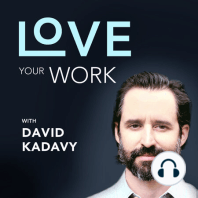108 min listen
301. 1,500 Words on Writing a 5-Word Tweet
FromLove Your Work
ratings:
Length:
13 minutes
Released:
May 4, 2023
Format:
Podcast episode
Description
Writing a tweet is a microcosm of writing a book. If you think deeply and carefully about every word in a tweet, and what the tweet as a whole communicates, you can extend those skills to all your writing. In this article, I’ll break down how to think about every word in a tweet, nearly tripling its performance. Step 1: The first-impression tweet The tweet we’ll work on came to me like most tweets, a thought that popped into my head. It was this: Ironically, strong opinions are the ones that are easily argued against. I could have just tweeted that. But I’ve made a habit of instead writing down my first-impression tweets in a scratch file, and later working on them before publishing. Here’s what my thought process looks like. As a tweet, this phrase is a little wordy, and weak. It starts somewhat nonsensically with an adverb: “Ironically.” What action is being performed ironically? Step 2: Improving word economy There are also some extra words that could be cut out. Do we have to refer to “strong opinions” again, by using the word “ones”? The word “that” is often not necessary, and it doesn’t seem necessary here. If we cut out all those extra words, we end up with: Strong opinions are easily argued against. Step 3: Adding back in meaning That’s shorter, more elegant, and economic. But now it’s weaker. It’s a simple statement of fact, without presenting what’s remarkable about that fact, or how anyone should feel about it. At least when it said, “ironically,” it pointed out the irony that strong opinions are those that are easily argued against. Also, since I’ve removed the second reference to “strong opinions” by removing the word “ones,” the statement no longer pits “strong opinions” against other types of opinions. Before, I was implying the existence of opinions that weren’t strong, and describing what was different about opinions that were. Our shortened statement is also in the passive voice, which makes it weaker. “Strong opinions are easily argued against,” by whom? Who is doing the arguing? It would be more direct to say: It’s easier to argue against strong opinions. But still, this statement doesn’t pit strong opinions against other types of opinions. Fixing that, we could instead say: Of all opinions, strong ones are easiest to argue against. Finally, I think we at least have an improvement over the original, “Ironically, strong opinions are the ones that are easily argued against.” It’s more direct, and pits strong opinions against opinions at-large. It also has the important quality, in tweet format, of delivering the most surprising – or ironic – thing about the statement at the end. There’s a bit of misdirection in this statement. We’ve addressed all opinions, homed in on the strong ones, which primes you to expect them to be lauded in some way. Instead, the statement points out the irony that what makes an opinion “strong” is that it’s easy to argue against. Step 4: Tweaking for the audience But this tweet is still not ready. The most glaring problem is, nowhere in the tweet is the term, “strong opinions,” and, as a tweet, that’s where its potential lies. “Strong opinions” is a term in the parlance of some sections of Twitter. This term became popular after Marc Andreessen appeared on Tim Ferriss’s podcast, where he advocated for, “strong opinions, weakly held.” By trying to be economical with words in our tweet, we’ve broken apart this term. In our latest iteration, “Of all opinions, strong ones are easiest to argue against,” it’s simply referred to as “strong ones.” Depending upon how prevalent the term “strong opinions” is in the minds of our audience members, we could stick with that more subtle hint. Sometimes that’s more effective. In my experience, on Twitter, you have to bash people over the head with what you’re saying to cut through the noise. So we could instead say: Of all opinions, strong opinions are easiest to argue against. We’ve replaced “strong ones” with “strong opinions.” It’s less
Released:
May 4, 2023
Format:
Podcast episode
Titles in the series (100)
6. Don't let your "baby" get slaughtered – Adrian Holovaty of Soundslice, Django, and Everyblock: Adrian Holovaty (@adrianholovaty) has learned the hard way that he wants to retain control of his business. After selling Everyblock, Adrian watched in horror as it was later shut down without warning. Adrian's new business is SoundSlice... by Love Your Work
